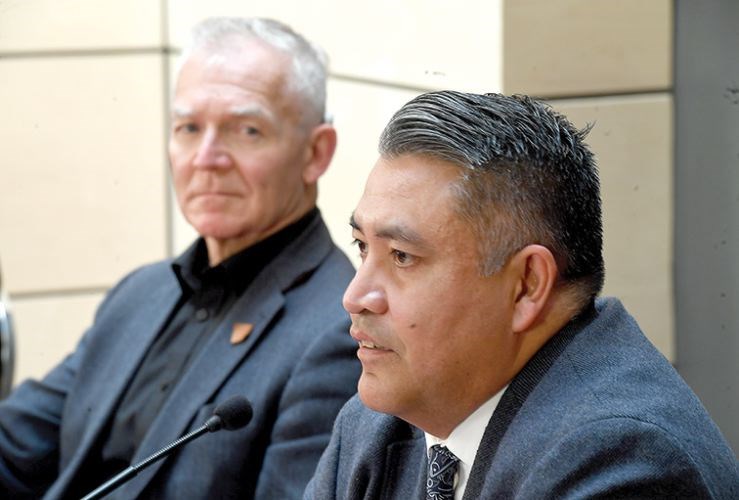B.C.'s First Nations and the provincial government just finished a three-year trial relationship on new ways to address economic development. The program is called the B.C. Assembly of First Nations (BCAFN) Economic Strategy.
On Lheidli T'enneh territory Tuesday, officials from both sides signed on for another two years. The strategy will be funded with $2.24 million in provincial funding.
After an official welcome by Lheidli T'enneh First Nation elder Darlene McIntosh, the pact was signed by B.C.'s Minister of Indigenous Relations and Reconciliation, Scott Fraser, and Assembly of First Nations Regional Chief Terry Teegee.
Joining them at the signatory table were Lake Babine Nation's former chief Wilf Adam and current Tahltan First Nation chief Rick Mclean.
Both of these leaders are members of the Champions' Table, a set of 11 First Nations leaders and 11 business leaders from across the province who sit together to exchange words towards the challenges and opportunities shared between their interests. This Champions' Table was created as part of the BCAFN Economic Strategy and is administrated by the B.C. Business Council.
A Prince George entrepreneur, Bob Redden of EDI Environmental Dynamics Inc., is a member of the Champions' Table and he was in attendance at the signing ceremony.
The conversation at the start of this collaboration happened in the lead-up to the 2016 launch of this initiative. It centred on how reconciliation could occur in an economic context. It was a response to how the First Nations of the province had been shut out of individual business projects and province-wide decision making as a habit. Proponent companies and provincial coffers had been taking steady income from the land and none of the revenue flowed to the traditional holders of that land, nor did much of the employment or economic spinoff.
Court rulings and popular opinion were now squarely opposed to a continuation of this exclusionary way of doing business. The Assembly of First Nations economic development strategy was given life.
"We are trying to erase those barriers and create a sustainable economy for our First Nations communities," said Teegee, giving thanks to the provincial government for extending the life of this strategy.
"It's not just talking about reconciliation, it's about actually implementing initiatives, walking the walk of what reconciliation actually means."
"The Assembly has created so much to be proud of," said Fraser.
"Looking to the future, I know that we share a vision of First Nations as true partners in a strong and equitable economy, based on respect and recognition of rights, across industry, in the marketplace, and through economic development... The Assembly's leadership role in developing the sustainable economic development strategy has already created a legacy of success."
In addition to the Champions' Table, the BCAFN Economic Strategy was also the launch pad for a First Nations Economic Development Toolkit called the Black Book (soon to be released across the province), and annual hosting of a provincewide First Nations Economic Development Forum that brings together First Nations, industry and government to discuss opportunities and wealth creation in B.C.
The strategy was also instrumental in creating the new Indigenous Intern Leadership Program administered by Vancouver Island University to match Indigenous post-secondary students with key businesses in their chosen fields of interest.
It started last year and over the course of its three-year plan will put about 150 young people into constructive career-boosting internships.
"B.C. can grow the economy as a national and international leader in partnership with First Nations, as we explore innovation and clean growth in a way that respects First Nations rights for the benefit of all British Columbians," said Teegee.



